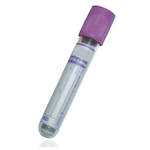Suitable Specimen Types
- EDTA Whole Blood
Sample Processing in Laboratory
Place in Trace Element rack in Send Away Fridge.Sample Preparation
None requiredTurnaround Time
5 working daysSample Stability
No special requirements
Cobalt (whole blood)
General Information
Cobalt is found in metal alloys that are very hard, have high melting points and are resistant to oxidation. Occupational exposure occurs during production and machining of these metal alloys and has led to interstitial lung disease. Cardiomyopathy and renal failure are symptomatic of acute cobalt exposure. However, the most effective means of identifying individuals with excessive cobalt exposure is through quantification of Urinary Cobalt.
Assessment of whole blood cobalt is of limited use. The only known essential role is as component of Vitamin B12. Investigation of cobalt deficiency per se is, therefore, inappropriate and would, in any event, be technically extremely difficult. Analysis of blood cobalt is of use with respect to individuals with metallic prosthetic joints. Cobalt values can be markedly raised in some such patients, but the significance of this is unclear, apart from, perhaps, indicating degree of joint degradation.
Patient Preparation
Cobalt clears from body within 3 days of exposure ceasing. Check patient still exposed at time of collection. Blood should not be taken using a steel needle.
Do not use Lithium Heparin.
Notes
None Given
Reference Range
Normal values: <10 nmol/L
MHRA Threshold (7ppb) for patients with MoM hip joints: 120 nmol/L
Specifications
- EQA Scheme?: Yes
- EQA Status: TEQAS
